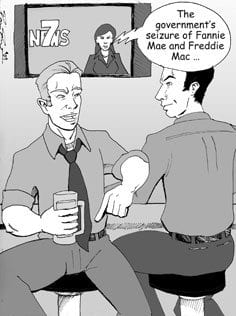
Banking 101
Those who keep up with the news are undoubtedly aware that America is in the midst of a banking crisis. Unfortunately, the banking system is so technical that few laymen are able to fathom just what is going on. Comparisons to the bank crisis of the Great Depression cause great anxiety among the public, and people are unaware of which policies will be beneficial and which will not be helpful.
While there is considerable concern about the banks’ willingness to lend, the greatest fear is that banks that appear to be strong will close their doors forever. Of course that is not a problem for small depositors; the Federal Deposit Insurance Corporation guarantees their funds up to $250,000.
The idea of big banks folding is nonetheless distressing. It is important, therefore, to have a rudimentary idea of how banks operate and what could cause a failure.
There are several reasons for a bank to close. Like any other business, it could close if its revenues — drawn from fees, loan interest and investment earnings — are not adequate to cover the costs of operation.
Another cause, which is rare, is an unwillingness or inability to comply with the myriad of rules and regulations that govern the banking industry. A third, even rarer cause is the collapse of the value of the bank’s investment portfolio.
Banks are required to prepare quarterly financial reports that state the difference between the price paid for all investments and their present total value. If the present value is less than the price paid, the difference must be shown as a loss on the financial report. This loss must be deducted from the bank’s capital account, so a severe loss could result in the bank not having the adequate capital required by law. Such a bank would technically be insolvent, even though it was earning a profit from its ordinary banking operations.
This is precisely what happened to the National Bank of Commerce in Berkeley, Ill. Regulators closed the bank despite its good credit quality because the government seizure of Fannie Mae and Freddie Mac essentially rendered worthless the bank’s investment in preferred shares of the mortgage giants.
The U.S. Department of the Treasury’s Troubled Asset Relief Program (TARP) provides funds to strengthen the balance sheets of banks that otherwise qualify for assistance and are approved by their regulators. OneUnited Bank, the nation’s largest black-owned and -managed bank, qualified for TARP funds because of the strength of its operating profit and loss statement.
The general public does not understand that the primary objective of the TARP funds is to bail out banks from the damage done to their capital by defaulting mortgages and the Fannie and Freddie seizures. Funds from deposits, debt service payments and borrowings provide banks with financial resources for loans. However, especially during a major economic recession, it is inadvisable for banks to exacerbate their problems by lending to customers with questionable credit.
The seizure of Fannie Mae and Freddie Mac has wreaked havoc on the banking system, and there is some question as to whether it was necessary. Fannie has not received any bailout funds from the government and Freddie has received $13.8 billion — a relatively small amount compared to the $45 billion given to Citigroup and the $85 billion to AIG.
President Barack Obama has stated that he is looking for help from the people. This means that the public must find the time to become acquainted with complex issues. It appears that the seizure of Fannie and Freddie was motivated more by politics than economic necessity. Uninformed voters are unable to protest effectively.
EDITOR’S NOTE: Bay State Banner Publisher and Editor Melvin B. Miller is a director of OneUnited Bank.






